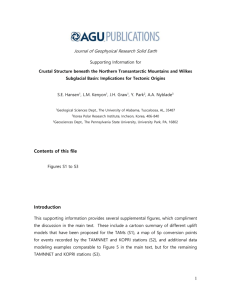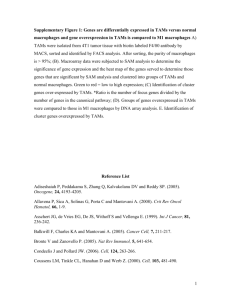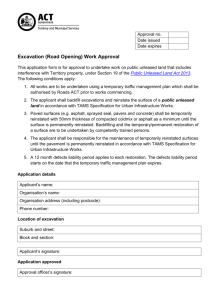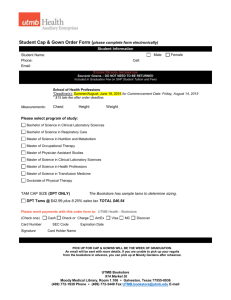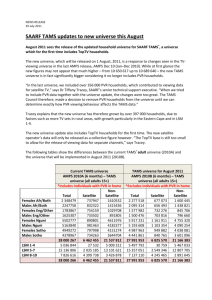Territory and Municipal Services (TAMS) Code of Conduct
advertisement
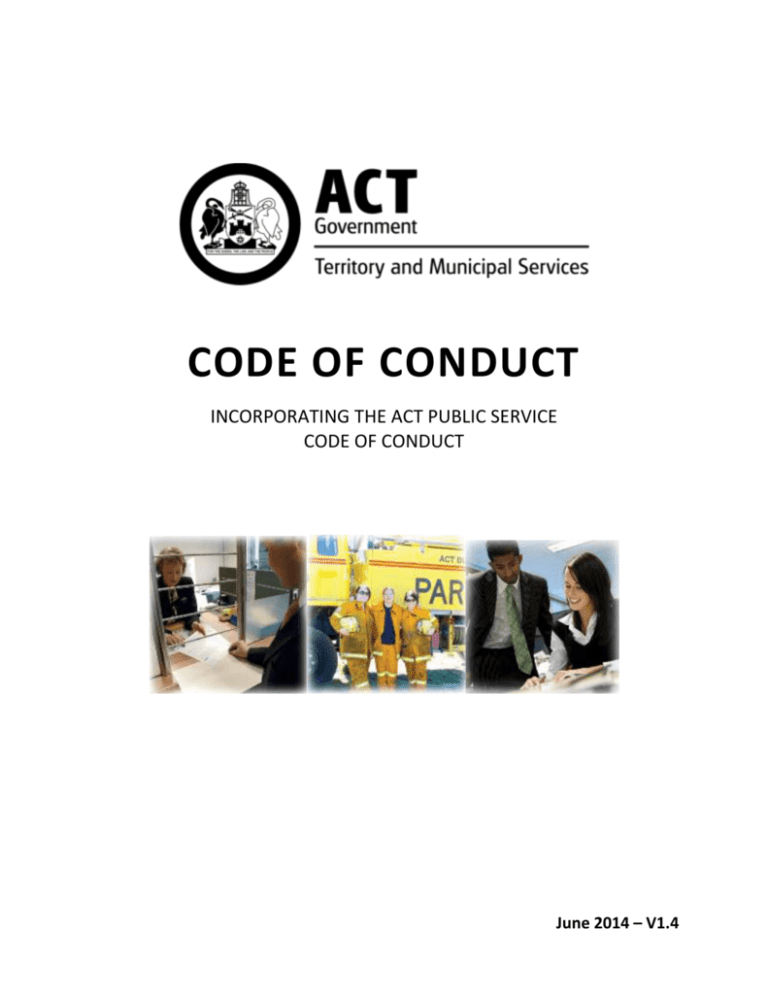
CODE OF CONDUCT INCORPORATING THE ACT PUBLIC SERVICE CODE OF CONDUCT June 2014 – V1.4 Amendment history Version no. Issue date Amendment details Author 1.0 11/2010 Initial release TAMS HR 1.2 08/2012 Amended to include social media use; TAMS HR TAMS dress standards. 1.3 11/2012 Incorporated ACTPS Code of Conduct; TAMS HR Amendments to reflect DirectorGeneral approval required for alcohol consumption/carriage; inserted amendment history; updated to accessible formatting; minor amendments flowing from changes to the Public Sector Management Standards. 1.4 6/2014 Updated references to reflect new TAMS HR Enterprise Agreements. Page 1 Table of Contents Amendment history ...................................................................................................... 1 Table of Contents .......................................................................................................... 2 ACT Public Service Code of Conduct ............................................................................... 5 ACTPS Employee Values ............................................................................................................. 5 ACT Public Service Signature Behaviours ................................................................................... 6 Summary of the TAMS Code of Conduct ........................................................................ 7 Reporting a breach of the Code of Conduct ............................................................................. 10 Message from the Director-General ............................................................................. 11 1. Introduction ............................................................................................................ 13 Why do we have a TAMS Code of Conduct? ............................................................................ 13 What is the basis for the TAMS Code of Conduct? ................................................................... 13 2. Applying the TAMS Code of Conduct ........................................................................ 15 Who does the TAMS Code of Conduct apply to? ..................................................................... 15 When does the TAMS Code of Conduct apply? ........................................................................ 15 What are my responsibilities under the TAMS Code of Conduct? ........................................... 15 What happens if I act inappropriately? .................................................................................... 16 Reporting a breach of the TAMS Code of Conduct................................................................... 17 3. The TAMS Code of Conduct and your obligations ..................................................... 18 Act with Integrity ...................................................................................................................... 18 Decision making..................................................................................................................... 18 Conflict of interest ................................................................................................................. 18 Gifts and benefits................................................................................................................... 19 Page 2 Outside employment (commonly known as a second job) .................................................... 19 Public comment ..................................................................................................................... 19 Media liaison ......................................................................................................................... 20 Communicating with members of the Legislative Assembly ................................................. 20 Internet and email use ........................................................................................................... 20 Social media ........................................................................................................................... 21 Confidentiality of information ............................................................................................... 22 Disclosure of information ...................................................................................................... 22 Selection processes ................................................................................................................ 23 Be Accountable ......................................................................................................................... 23 Know the law and the policies that apply to your work ........................................................ 23 Responsiveness and diligence ................................................................................................ 24 Record Keeping ...................................................................................................................... 25 Be Respectful ............................................................................................................................ 25 Show respect for others ......................................................................................................... 25 Supervise employees responsibly .......................................................................................... 26 Bullying and harassment ....................................................................................................... 26 Be Professional ......................................................................................................................... 27 Act professionally .................................................................................................................. 27 Work to the best of your ability ............................................................................................. 28 Work safely ............................................................................................................................ 28 Impairment from alcohol or drugs ........................................................................................ 29 Smoke Free Workplaces......................................................................................................... 29 Expectations of Dress Standards ........................................................................................... 29 4. Where to get further help to understand your responsibilities ................................. 31 APPENDIX A – Section 9 of the Public Sector Management Act 1994 ..................................... 33 General obligations of public employees ................................................................................. 33 APPENDIX B – Table Summary of the TAMS Code of Conduct ................................................. 34 Page 3 This page is intentionally blank. Page 4 ACT Public Service Code of Conduct The Commissioner for Public Administration launched the ACT Public Service (ACTPS) Code of Conduct in October 2012. The ACTPS Code of Conduct establishes Employee Values and Signature Behaviours that define the ACTPS as an organisation. Through the Territory and Municipal Services Directorate (TAMS) Code of Conduct, the Directorate has built upon the ACTPS Code of Conduct by detailing how we conduct ourselves in meeting these standards. ACTPS Employee Values Respect – in the ACTPS means treating others with the sensitivity, courtesy and understanding we would wish for ourselves, and recognising that everyone has something to offer. It means thinking “would I be happy if this was happening to me” and rests on a foundation of fundamental decency in our dealings with colleagues and clients alike. Integrity – in the ACTPS means being apolitical, honest, dependable, and accountable in our dealings with ministers, the Parliament, the public and each other. It means recognising achievement, not shirking uncomfortable conversations and implies a consistency in our dealings with others. Collaboration – in the ACTPS means actively sharing information and resources, working together towards shared goals and asking “who else do I need to talk to to get this right”. It means actively seeking opportunities for breaking down unhealthy silos and relies on genuine engagement with colleagues in the ACTPS and with the broader community. Innovation – in the ACTPS means asking “but why”, actively seeking out new and better ways of doing what we do (as well as better things to do), and not settling for how it has always been. It means empowering colleagues at all levels to raise new ideas and necessitates sensible and thoughtful engagement with risk. Page 5 ACT Public Service Signature Behaviours In demonstrating respect... 1. We take pride in our work 2. We value and acknowledge the contribution of others 3. We relate to colleagues and clients in a fair, decent, caring and professional manner In demonstrating integrity... 4. We do what we say we’ll do and respond appropriately, especially when the unexpected occurs 5. We take responsibility and are accountable for our decisions and actions 6. We engage genuinely with the community, and manage the resources entrusted to us honestly and responsibly In demonstrating collaboration... 7. We work openly and share appropriate information to reach shared goals 8. We actively seek out other views when solving problems and value and act on feedback on how we can do things better In demonstrating innovation... 9. We look for ways to continuously improve our services and skills 10. We are open to change and new ideas from all sources Page 6 Summary of the TAMS Code of Conduct The ACT Territory and Municipal Services Directorate (TAMS) Code of Conduct sets out the standards of behaviour expected of all TAMS employees to meet their obligations as detailed in the ACTPS Code of Conduct and Public Sector Management Act 1994. The TAMS Code of Conduct expands on the Employee Values and Signature Behaviours established by the ACTPS Code of Conduct, prescribing how TAMS employees must conduct themselves. Reference to specific linkages between the TAMS Code of Conduct and ACTPS Employee Values of Respect (1), Integrity (2), Collaboration (3), and Innovation (4) is made with these numbers. As TAMS employees, you are expected to: act with integrity (2) be accountable (1,2,3,4) be respectful (1,2,3,4) be professional (1,2,3,4) These behaviours are summarised below, and apply to all dealings with Ministers, customers, the community, supervisors/managers and colleagues. Page 7 Act with Integrity (2) Acting with integrity is about behaving ethically at work and in all your dealings with people. You act with integrity by: making fair and transparent decisions; (2) reporting any suspected fraud, corruption or criminal conduct to your supervisor/manager; (2) telling your supervisor/manager about any personal interest, beliefs or opportunities to benefit in a matter that could influence your ability to perform your duties and responsibilities, including any gifts you receive at work; (2) never using your position improperly for personal gain or to gain an advantage in your private life, including favours for family and friends; (2) making it clear if you make public comments about work matters that these are your personal views; (2) using government information and communication technology appropriately, including any email and internet use; (2) accessing information only when it is part of your job; and (2) releasing official information only when authorised or it is already publicly available. (2) Be Accountable (1,2,3,4) As a TAMS employee, you are accountable to your colleagues, supervisors/managers, the Director-General and the ACT Government for your actions. You demonstrate accountability by: having a working knowledge of the laws and policies that apply to your work; (2) carrying out any lawful and reasonable directions you are given; (3,4) providing advice that is honest; (3,4) being open about reporting mistakes, and dealing justly with others when mistakes are made; (1,2,3,4) arriving and departing work at the times specified or agreed by your supervisor/manager, and notifying of any planned or unexpected absences; (1,2) Page 8 ensuring that money and resources are used properly and not wasted; (1,2,3,4) not taking or misusing any government property; and (1,2,3,4) maintaining records and securing them appropriately. (2) Be Respectful (1,2,3,4) TAMS is committed to delivering services and creating workplaces where people are respected and diversity is embraced. You show respect to others by: treating people with courtesy, honesty and fairness; (1,2,3,4) respecting different values, beliefs, cultures and religions; (1,2,3,4) working cooperatively and respecting the contribution of the people who work with you; (1,2,3,4) not harassing, bullying, intimidating or unlawfully discriminating against other people; and (1,2,3) reporting any incidents of harassment or bullying by the public or another colleague, including acts of violence, aggression or intimidation, to your supervisor/manager. (1,2,3,4) Be Professional (1,2,3,4) You will always try to act professionally and in a manner that builds the reputation of TAMS. You demonstrate professionalism by: dealing with individuals and groups fairly, effectively and impartially; (1,4) working to the best of your ability; (1,2,3,4) working safely and reporting all workplace health and safety incidents to your supervisor/manager; (1,2,3,4) maintaining a clean and tidy appearance and wearing a uniform/Personal Protective Equipment if required; (2,3) representing TAMS appropriately; and (2,3) avoiding conduct that could damage the reputation of TAMS. (3,4) Note: The above principles are also summarised in table form at Appendix B. Page 9 Reporting a breach of the Code of Conduct You are required to report any suspected breaches of the TAMS Code of Conduct or official misconduct that you become aware of at work. Report your concerns to your supervisor/manager, or seek advice from TAMS Human Resources on (02) 6207 6737 or by email at TAMS.HRInfo@act.gov.au. Where fraud or corruption is suspected, you are required to report this to the Senior Executive Responsible for Business Integrity Risk (SERBIR), either directly or through your supervisor/manager. The SERBIR can be contacted on (02) 6207 2645 or by email at TAMS_SERBIR@act.gov.au. This summary of the TAMS Code of Conduct is a guide only. To ensure you fully understand your responsibilities, you should read the full TAMS Code of Conduct. Please note that the TAMS Code of Conduct does not replace the legal requirements of section 9 of the Public Sector Management Act 1994. Page 10 Message from the Director-General Working in TAMS, we have an obligation and responsibility to the ACT Government, to the community, to our colleagues and to ourselves to act and behave appropriately. What we do and say at work reflects both our personal values and those of the Directorate. Every day, as we go about delivering our services, people observe us and comment on our actions and behaviours. I am often reminded that one of the main reasons people enjoy working in TAMS is because of the work environment and the fact that we all work well together. This is something of which we can be proud. For TAMS, I expect the highest level of integrity and accountability in everything we do. I expect in our dealings with each other and the community we will continue to show respect and tolerance, noting that sometimes we will face challenges and frustrations. I expect at all times we will act as a professional public service, displaying high ethical standards that set the example to which others should aspire. These high ethical standards reflect the position in which we have been placed by government and the public to carry out important service delivery functions. Our personal standards of behaviour such as integrity, respect, diligence, and courtesy should be unrivalled. Our ethical behaviour must be reflected by our use of resources in an efficient, effective and ethical way, consistent with the requirements of the Financial Management and Accountability Act 1997. The TAMS Code of Conduct does several things: It supplements and explains how TAMS implements the ACT Public Service Code of Conduct; It sets out those actions, standards of behaviour and level of professionalism I expect of all staff and identifies those behaviours that will not be tolerated; It should deter conduct that would weaken public confidence in our behaviours while reinforcing our reputation as an organisation that is trustworthy, well behaved, responsive and provides value for money; It should promote ethical behaviour and integrity by encouraging staff to fulfil their obligations and responsibilities in the workplace, which will subsequently be reflected in the services we deliver; and It provides guiding principles to assist decision making in the course of our daily work. Page 11 Everyone is responsible for adhering to this Code of Conduct. I expect everyone to read it and act in accordance with it. For the supervisors/managers in TAMS I place the additional responsibility of ensuring all your staff understands it. Both the Government and community need to be confident in our capacity to efficiently, effectively and ethically administer public money and property, provide good services, and work diligently and professionally. These things go to very core of who we are and what we do. Gary Byles Director-General Page 12 1. Introduction Why do we have a TAMS Code of Conduct? All TAMS employees are expected to achieve and demonstrate high standards of conduct and work performance to ensure that public confidence in the ACT Public Service (ACTPS) is maintained. The purpose of the TAMS Code of Conduct is to provide guidance relating to the ACTPS Code of Conduct and section 9 of the Public Sector Management Act 1994 (Appendix A) and refer to other relevant legislation and policies that govern behaviour. It details the standard of behaviour TAMS expects from our employees to comply with legislative and other policy requirements. As an employee, it is your responsibility to understand your obligations and maintain an awareness of your rights. This document aims to support you to do this. What is the basis for the TAMS Code of Conduct? Your responsibilities and behaviours as ACT public employees are governed by legislation, agreements and policies, including the: Public Sector Management Act 1994 (the PSM Act) and Public Sector Management Standards 2006 (the PSM Standards) ACT Public Service Code of Conduct Fair Work Act 2009 and Fair Work Regulations 2009 Safety, Rehabilitation and Compensation Act 1988 Work Health and Safety Act 2011 Financial Management and Accountability Act 1997 Workplace Privacy Act 2011 Relevant Enterprise Agreements ACTPS Respect, Equity and Diversity (RED) Framework. ACTPS Integrity Policy and Code of Ethics Acceptable Use of ICT Resources Policy Page 13 Director-General Financial Instructions Section 6 of the PSM Act provides the following ACTPS values and principles: (a) service to the public; (b) responsiveness to — (i) the requirements of the government; (ii) the needs of the public; (c) accountability to the government for the ways in which functions are performed; (d) fairness and integrity; (e) efficiency and effectiveness. Page 14 2. Applying the TAMS Code of Conduct Who does the TAMS Code of Conduct apply to? This Code of Conduct applies to all TAMS employees, agents, contractors, labour hire, volunteers and Board appointees, whether permanent, temporary, full-time, part-time or casual. Employees are those who have obligations under the PSM Act, and include temporary and casual staff. While agents, contractors, labour hire, volunteers and Board appointees are not considered employees, TAMS expects that the principles and behaviours reflected in this Code of Conduct will apply to these people and/or service providers. When does the TAMS Code of Conduct apply? You are required to display behaviour consistent with the TAMS Code of Conduct when you are: undertaking any component of your official duties; in the workplace or in a work related context; participating in work related social activities; or able to be identified as a TAMS employee or a representative of TAMS. What are my responsibilities under the TAMS Code of Conduct? All employees are responsible for ensuring that their behaviour reflects the standards outlined in the TAMS Code of Conduct. Supervisors/managers will support employees to understand their responsibilities under the TAMS Code of Conduct, demonstrate appropriate behaviours through leading by example and take necessary action when inappropriate behaviour is identified. Supervisors/managers will ensure that agents, contractors, labour hire, volunteers and Board appointees are aware of their obligations to behave in a manner consistent with the TAMS Code of Conduct. Page 15 What happens if I act inappropriately? Action may be taken where conduct is considered inconsistent with the behaviour expected by the Directorate, as expressed by this Code of Conduct.1 In determining the action to be taken, the nature and seriousness of the behaviour will be considered. Supervisors/managers will respond to any allegation of misconduct in accordance with the requirements of the TAMS EA and ACTION EA, your applicable contract, or as otherwise appropriate having regard to the circumstances of your engagement with TAMS. If there is a suspected breach of section 9 of the PSM Act, the following actions may be taken: an investigation under section H of the TAMS EA and section G of the ACTION EA in cases of suspected criminal activity, referral to the Australian Federal Police. 2 The consequences for agents, contractors, labour hire, volunteers and Board appointees that display behaviour inconsistent with this Code of Conduct will depend on the nature of the agreement between that person or service provider and the Directorate. Information on misconduct and discipline procedures is available on the TAMS Intranet and on the Shared Services Customer Service Portal. Alternatively, TAMS Human Resources can provide further information and advice. 1 Please note formal discipline action can only be undertaken against employees where there has been a breach of the PSM Act and/or Standards. 2 Consistent with section 17 of the Standards. Page 16 Reporting a breach of the TAMS Code of Conduct You are required to report any inappropriate workplace behaviour, suspected breaches of the TAMS Code of Conduct or official misconduct of which you become aware at work.3 Report your concerns to your supervisor/manager, or seek advice from TAMS Human Resources on (02) 6207 6737 or by email at TAMS.HRInfo@act.gov.au. You have a right to query decisions or actions that impact on your employment. In the first instance, you should raise the matter with your supervisor/manager. Alternatively, contact TAMS Human Resources. Where fraud or corruption is suspected, this is required to be reported to the Senior Executive Responsible for Business Integrity Risk (SERBIR), either directly or through your supervisor/manager. Persons reporting suspected fraud or corruption are protected under the provisions of the Public Interest Disclosure Act 1994. A guide on Public Interest Disclosures and the TAMS Fraud and Corruption Plan 2011-2013 is available on the TAMS Intranet. 3 Consistent with section 9 (q) of the PSM Act. Page 17 3. The TAMS Code of Conduct and your obligations Act with Integrity Decision making The decision making process will ensure that: processes are fair and transparent; all matters are considered on their merits without regard to outside influences or personal interests, including political views and activities;4 decisions are made in an unprejudiced, objective and efficient manner precluding the perception, potential for, or undertaking of fraudulent or corrupt behaviour;5 and any delegated authority is exercised in a manner that demonstrates an understanding of the authority and the limitations of the delegation. Report any suspected fraud, corruption or criminal conduct to your supervisor/manager, or to the SERBIR. For further information, the ACTPS Integrity Policy is available on the Chief Minister and Treasury Directorate (CMTD) website. Conflict of interest A conflict of interest may exist if you have any personal interest, beliefs or opportunity to benefit in a matter that could influence your ability to perform your duties and responsibilities. You will disclose to your supervisor/manager any actual, apparent or potential conflicts of interest, arising from personal, financial or any other interests, which may affect your work performance or the Directorate’s reputation.6 You will not use your official position to harass or oppress another person or to coerce a member of the public or another employee unlawfully.7, 8 4 Consistent with section 9 (b) of the PSM Act. 5 Consistent with section 9 (c) and (k) of the PSM Act. 6 Consistent with section 9 (j) of the PSM Act. 7 Consistent with section 9 (g) of the PSM Act. Page 18 You will not use your position in TAMS for personal gain, nor to gain an advantage in your private life by, for example, arranging jobs, transfers or benefits for family or friends. You will maintain an awareness of perceived or potential conflicts of interest and discuss with your supervisor/manager appropriate ways to address possible issues. Gifts and benefits All gifts or benefits offered or received, related in any way to the performance of your official duties, must be reported to your supervisor/manager who will advise you on the correct procedure to follow. Further guidance on gifts and benefits is in the ACTPS Code of Ethics on the CMTD website and the TAMS Guidelines for Hospitality, Gifts and Benefits on the TAMS Intranet. Note: gifts of money must not be accepted under any circumstances. Outside employment (commonly known as a second job) A second job means employment other than your primary employment position and includes paid employment, business involvement, Board appointments, company positions, voluntary work or any other profitable activity outside official duties. The approval of the Directorate is required before you undertake any of these activities or perform work outside of official duties.9 If you are considering undertaking a second job please discuss with your supervisor/manager and complete the Application for Approval for a Second Job form, available on the Shared Services Customer Service Portal. Public comment As a private citizen, you have the right to make public comments of your personal views on political and social issues. However, it is recommended that you refrain from making public comments on matters that you are involved in as an ACTPS employee, as such comments could be perceived as reflecting the official view of the Directorate. If you do make comment in those circumstances, it is important that: you make it clear those comments represent your personal views as a private citizen; the comments do not raise reasonable doubt about your willingness to objectively implement government policies; the comments do not amount to a personal attack; 8 Consistent with section 9 (f) of the PSM Act. 9 Consistent with section 11 of the Standards. Page 19 the comments do not lead to a breach of confidentiality or disclosure of information that is not in the public domain; and you do not use ACT Government resources for this purpose. Comment made through social media should be considered in accordance with this Code of Conduct (refer to the ‘Social media’ section below). Media liaison If you are contacted by the media, do not provide information or comment on any issue without approval. Pass the enquiry directly to the Director of Governance on (02) 6207 5040 and alert your supervisor/manager or Director. If you wish to contact the media for publicity or promotion purposes, you must first obtain approval from your Executive Director and notify the Governance team. More information on managing media matters can be found in the TAMS Media Guidelines on the TAMS Intranet. Communicating with members of the Legislative Assembly Any communication with members of the Legislative Assembly undertaken as part of your official duties will be through formal communication channels to ensure any information released has the appropriate approval. If a Minister (or their office) that has portfolio responsibilities that fall within the Directorate contacts you as part of your official duties, you are required to take details of their request. You will notify your Director or Executive Director and the Director, Governance before providing any information to ensure the correct approval to release information is in place. If other members of the Legislative Assembly or their office contact you as part of your official duties, you will advise your Director and refer the request to the Minister’s office responsible. In your capacity as a private citizen, you have the right to communicate directly with members of the Legislative Assembly on any issue affecting you as a private citizen. However, ACT Government resources are not to be used for this purpose (for example, using government email or letterhead). Internet and email use You will not create, send or access information on the internet or through email at work or via remote access that could: damage the Government; reputation of TAMS or the ACT Page 20 be considered or perceived by the receiver of the information as victimisation or harassment; lead to criminal penalty or civil liability; be reasonably found to be offensive, obscene, threatening, abusive or defamatory; undermine or compromise the ACT Government’s network or equipment; or be misleading or deceptive. This includes pornography or other offensive materials. Breaches of these requirements are taken seriously and may result in discipline action. The Acceptable Use of ICT Resources Policy is available on the Shared Services Customer Service Portal and the TAMS Guidelines for Email Use and other electronic communication tools are available on the TAMS Intranet.10 Social media Employees must be aware that their comments expressed in social media forums - such as Facebook and Twitter or RiotACT - may lead to discipline action where the comments are found to be inappropriate and a connection to the workplace is established. A connection to the workplace may exist where the nature of the comments identify the person making them as a TAMS or ACT Government employee. A delegate can determine such connection exists whether or not TAMS or the ACT Government has been expressly identified. Inappropriate comment includes, but is not limited to, those of an offensive, obscene, threatening, abusive or defamatory nature, whether in reference to, or directed towards, a colleague, a member of the public, the Directorate or ACT Government. An employee found to have posted inappropriate comments in a social media forum may be subject to discipline action in accordance with the TAMS Enterprise Agreement. Despite privacy mechanisms in many social media tools, your content should be considered public. Accordingly, employees are advised to exercise discretion in determining what content they express in social media. Where a perceivable connection might exist between such content and the workplace, it is important to ensure that the content accords with values and requirements of the TAMS Code of Conduct and the ACTPS Respect, Equity and Diversity framework. Using ACT Government ICT Resources for activities that might be inappropriate is forbidden and may lead to disciplinary action being taken. 10 Consistent with section 9 (o) of the PSM Act and section 22 of the Standards. Page 21 Confidentiality of information You will: collect and manage personal and sensitive information responsibly and transparently in accordance with the Workplace Privacy Act 2011; access information regarding a customer or another employee only when it is part of your job, it is lawful or when specific consent is given;11 avoid discussions involving customer or employee details with other colleagues or members of the public who do not have a professional need to know; and act in accordance with the law when releasing any information, to maintain client privacy and employee confidentiality.12 If in doubt, seek clarification from your supervisor/manager about how to deal with or release information. Further information on your obligations under the Workplace Privacy Act 2011 is available on the ACT Legislation Register and on the TAMS Intranet. Disclosure of information You may only release information obtained through your work for TAMS where: its release is authorised by statute of regulation or as required by law; the information is not considered confidential; the information is already available in the public arena; the information would normally be given to a member of the public; and it is part of your official work duties and is consistent with this Code of Conduct. If you attempt to access, use or disclose information other than for official purposes and/or without the approval of the Directorate this may be considered misconduct.13 Upon ceasing employment with the ACTPS, you will not use confidential information gained in employment with the ACTPS without the appropriate approval. This includes advantaging a new 11 Consistent with section 9 (m) of the PSM Act. 12 Consistent with section 9 (m) of the PSM Act. 13 Consistent with section 9 (k), (l) and (m) of the PSM Act. Page 22 or potential) employer or disadvantaging the ACTPS in commercial or other relationships with that employer14. Selection processes All recruitment and selection processes will be fair, transparent and based on merit, reflecting the principles of fairness outlined in Recruitment in the ACT Public Service guide. Be Accountable Know the law and the policies that apply to your work You will comply with all ACT Government and Directorate policies, procedures and guidelines. To assist in this you will have a working knowledge of the laws, policies and industrial entitlements that apply to your work, including this Code of Conduct.15 Further to this, you will exercise reasonable care, skill and diligence to ensure that information and advice provided to the public, upon which they are likely to rely, is accurate.16 This includes: assisting the public to understand their entitlements and requirements according to the laws within which we operate; proactively explaining how government policies, programs and services are applied to ensure that the community fully understands how these policies, programs and services operate; providing information on the rights and responsibilities of clients and customers; and making available procedures on how to lodge complaints and provide feedback to the Directorate.17 Supervisors/managers have a responsibility to assist employees to understand relevant legislation or policies including specific legal requirements. Supervisors/managers will ensure that any appropriate security clearances are maintained and adhered to, and that your access to files is undertaken within the security level allocated. 14 Consistent with section 9 (m) of the PSM Act and section 18 and 626A (Executives) of the Standards. 15 Consistent with section 9 (h) of the PSM Act. 16 Consistent with section 9 (a) of the PSM Act. 17 Consistent with section 9 (e) of the PSM Act. Page 23 Responsiveness and diligence As a public employee, you are required to carry out any lawful and reasonable directions you are given by a person with the appropriate authority.18 The Directorate expects that you will implement government decisions promptly, conscientiously, efficiently and effectively. To do this, you will: provide advice that is honest, comprehensive, accurate and timely, in a clear and succinct manner;19 exercise sound judgement, be open about reporting mistakes supervisor/manager, deal justly with employees when mistakes are made; comply with the TAMS Attendance Policy by arriving and departing work at the times specified or agreed by your supervisor/manager, and notifying of any planned or unexpected absences; be open and transparent with the use and expenditure of all public money, being mindful of public scrutiny of government resources; ensure that resources are used properly, not wasted and not used extravagantly;20 not take or misuse any property that does not belong to you.21 Theft and fraud are not acceptable and action will be taken by the Directorate to investigate those cases;22 use government vehicles appropriately, as outlined in the policy and guidelines indicated below; effectively participate in regular performance management reviews, or if a supervisor/manager, implement these reviews for any employees you supervise;23 participate in any audit, internal or external review processes in an honest, open and responsive manner; and prepare or contribute to reports and other documents to meet the Directorate’s statutory and administrative reporting requirements as required. 18 Consistent with section 9 (i) of the PSM Act. 19 Consistent with section 9 (c) of the PSM Act. 20 Consistent with section 9 (o) & (p) of the PSM Act. 21 Consistent with section 9 (o) of the PSM Act. 22 Consistent with section 15 of the Standards. 23 Consistent with section 559 of the Standards. and if a Page 24 The ACT Public Service Non-executive Passenger and Light Commercial Vehicle Management Guidelines is available on the CMTD website. The TAMS guidelines on travel and home garaging of government vehicles are available on the TAMS Intranet. The TAMS Attendance Policy and further information on attendance and leave is also available on the TAMS Intranet. Record Keeping You will ensure that: all significant decisions or actions are documented to a standard that would withstand independent scrutiny; good record keeping practices are maintained, as required under the Territory Records Act 2002; sensitive information is kept out of sight in an appropriate area (for example, locked cabinets); and material produced for, and belonging to, the Directorate is not removed without the approval of the Director-General. The Territory Records Act 2002 is available on the ACT Legislation Register website. For more information, refer to the Territory Records Office website and the TAMS Record Management Policy and Procedures. Be Respectful Show respect for others To show respect for others you will always: 24 treat all people with courtesy and honesty, being aware and sensitive to their rights, duties and aspirations, including different values, beliefs, cultures and religions;24 act in a manner that conveys an understanding of the principles of equity and diversity and that meets the requirements of equal opportunity, human rights and antidiscrimination legislation; and work cooperatively and respect the contribution of the people who work with you. Consistent with section 9 (d) of the PSM Act. Page 25 Further information on the ACTPS Respect, Equity and Diversity Framework is available on the CMTD website. Supervise employees responsibly Supervisors/managers have added responsibilities for creating respectful workplaces. They are expected to: lead by example; encourage teamwork and promote a culture of openness; avoid bias or favouritism and make fair, transparent and consistent decisions; support employees to improve their skills and performance; encourage employees to ask questions and promote a learning environment; foster a positive and motivated work environment; ensure employees understand performance expectations and that their performance is objectively assessed against these standards; take employees concerns seriously and act without delay; provide clear and constructive feedback to employees and welcome their feedback; and address inappropriate behaviour that may result in a breach of the TAMS Code of Conduct promptly to avoid escalation. Bullying and harassment Bullying and harassment in the workplace is inappropriate and unacceptable. This includes: harassing, bullying, violent, aggressive and intimidating behaviour towards others; unlawfully discriminating against others; inappropriate behaviour towards other employees or to members of the public;25 or inappropriate behaviour from a member of the public to a TAMS employee. All employees have the right to expect to work in a safe and healthy work environment and you should not tolerate any violent, aggressive and/or intimidating behaviour towards you. 25 Consistent with section 9 (f) of the PSM Act. Page 26 You are required to report any incidents of violent, aggressive and/or intimidating behaviour to your supervisor/manager, or contact TAMS Human Resources for further advice or assistance. Reported incidents can be investigated with a view to preventing or minimising any aggression or violence in the future. Supervisors/managers are expected to provide leadership in eliminating bullying and other aggressive or coercive behaviours. Employees found to have conducted or condoned bullying or harassment may be subject to discipline action. The Work Health and Safety Act 2011 imposes responsibilities on both employers and employees to take steps to prevent or reduce the likelihood of bullying occurring in the workplace, with further information available on the Work Safe ACT website and in the ACTPS RED Framework. Be Professional Act professionally You will always try to act professionally and in a manner that builds the positive reputation of TAMS. This includes: performing official duties with skill, care and diligence;26 performing your role in a fair and unbiased way;27 dealing with all individuals and groups fairly, effectively and impartially;28 maintaining a professional appearance, with presentation to be clean, tidy and appropriate for your work role, and in line with occupational health and safety requirements; where a uniform/Personal Protective Equipment is required, wearing it as directed; and maintaining professional relationships with colleagues, customers and the public. 26 Consistent with section 9 (a) of the PSM Act. 27 Consistent with section 9 (c) of the PSM Act. 28 Consistent with section 9 (b) of the PSM Act. Page 27 Work to the best of your ability All employees will perform their duties to the best of their ability with care, competence and efficiency.29 You will endeavour to: maintain and improve your knowledge and skills; take a whole-of-government view, drawing on professional knowledge and expertise and consulting relevant stakeholders to understand their different perspectives; and provide practical and realistic options and undertake an assessment of their costs, benefits and consequences. Work safely All employees are responsible for taking reasonable action to protect the health, safety and welfare of themselves and others in the workplace by providing and maintaining a safe work environment.30 This includes: complying with instructions given for workplace health and safety; reporting all workplace health and safety problems, hazards and incidents to your supervisor/manager; and using any personal protective equipment provided for work. A supervisor/manager will ensure work safety by managing risk, which means taking all reasonable and practical steps to identify, eliminate or minimise risk. If it is not reasonably practical to eliminate risk, it may be minimised (for example, through use of personal protective equipment). For more information, refer to the Work Health and Safety Act 2011 on the ACT Legislation Register website. 29 Consistent with section 9 (a) of the PSM Act. 30 Consistent with section 8 (d) of the PSM Act. Page 28 Impairment from alcohol or drugs You are not permitted to consume alcohol while on duty or on government premises during working hours unless authorised by the Director-General in writing31. You are also not permitted to consume alcohol in or on a government vehicle, and the Director-General authorisation is required for alcohol to be transported in a government vehicle.32 All Employees will ensure they are able to perform their duties without having their performance inhibited by alcohol or any other drug (prescription or otherwise). This is critical in situations involving the operation of vehicles, equipment or machinery where the safety of the operator or others could be at risk. If you are concerned that medication you are taking may affect your work performance alert your supervisor/manager, as alternative duties may need to be considered for the duration of the course of treatment. If you are in a workplace and believe another employee is not able to fulfil their duties appropriately or safely due to suspected impairment from drugs or alcohol, you will advise the relevant supervisor/manager immediately. The ACTPS Alcohol and Other Drug Policy is available on the CMTD website. Note: Under the Road Transport (Alcohol and Drug) Act 1977, a blood alcohol concentration of zero applies to ‘Special Drivers’. This includes TAMS staff that operate public vehicles and heavy vehicles, including for example, ACTION Bus Drivers. Smoke Free Workplaces You are not permitted to smoke in ACT Government leased or owned motor vehicles and buildings including depots, workshops, sheds or storage facilities, or within 15 metres of the entry/exit points, windows and air intakes of all TAMS owned and leased buildings and structures. The TAMS Smoke Free Workplace Policy is available on the TAMS Intranet. Expectations of Dress Standards Dress, personal appearance and hygiene are important elements of professional presentation. TAMS employees must ensure their personal appearance and presentation is clean, tidy and appropriate for their work role and environment. This is particularly so, given that as a TAMS employee you may be required to represent the Directorate and or the ACT Government in meetings and otherwise engage with various stakeholders, including for example, ACT Public 31 Consistent with section 17 of the Standards. 32 Consistent with section 17 of the Standards. Page 29 Service (ACTPS) peers, government officials, external professionals and/or members of the public. Employees who wear a uniform or other apparel that identifies them as an employee of TAMS / ACT Government - including Personal Protective Equipment (PPE) - must ensure that the uniform or apparel is clean, complete, in good repair and worn with pride. PPE should also be worn at all appropriate times to ensure obligations under relevant healthy and safety legislation are met. If you are wearing a TAMS uniform, or you are otherwise identifiable as a TAMS / ACT Government employee while off duty, you are expected to avoid conduct that may adversely affect the image or reputation of TAMS / ACT Government. Under no circumstance should you wear apparel in licensed premises - such as hotels, clubs, casinos etc - that can identify you as a TAMS / ACT Government employee (including identification passes, clothes and uniforms with TAMS/ACT Government business logos etc). This includes any work approved social event. Inappropriate dress includes but is not limited to thongs, torn, damaged or untidy clothing, t-shirts with inappropriate logos. Page 30 4. Where to get further help to understand your responsibilities The ACT Government and TAMS has a range of corporate policies and guidelines to deal with many issues addressed in the TAMS Code of Conduct. Further assistance can also be obtained from your supervisor/manager or one of the people referred to below. TAMS Senior Executive Responsible for Business Integrity Risk (SERBIR) Deputy Director-General Phone: (02) 6207 2645 Email: TAMS_SERBIR@act.gov.au TAMS Human Resources, Employee Relations Phone: (02) 6207 6737 Email: TAMS.HRInfo@act.gov.au Director, Human Resources Phone: (02) 6207 5506 Director, Governance Phone: (02) 6207 5040 Senior Manager, Security and Risk (Agency Security Advisor) Phone: (02) 6207 6993 Senior Manager, Community Engagement and Communications Phone: (02) 6205 0312 Public Sector Management Act 1994: http://www.legislation.act.gov.au/a/1994-37/ Public Sector Management Standards 2006: http://www.legislation.act.gov.au/di/2006-187/default.asp ACT Public Service Code of Ethics and Integrity Policy: Page 31 http://www.cmd.act.gov.au/governance/public/ethics ACT Public Service Code of Conduct: http://www.cmd.act.gov.au/__data/assets/pdf_file/0017/363230/codeofcond2012.pdf TAMS Public Interest Disclosure Framework: http://tamsintranet.act.gov.au/corporate_information/fraud_and_corruption_prevention TAMS Director-General Financial Instructions: http://tamsintranet.act.gov.au/finance/legislative_framework Relevant Enterprise Agreements: http://www.jobs.act.gov.au/about-the-actps/agreements TAMS policies, guidelines, procedures and delegations available on the TAMS intranet: http://tamsintranet.act.gov.au Page 32 APPENDIX A – Section 9 of the Public Sector Management Act 1994 General obligations of public employees A public employee shall, in performing his or her duties: (a) exercise reasonable care and skill; (b) act impartially; (c) act with probity; (d) treat members of the public and other public employees with courtesy and sensitivity to their rights, duties and aspirations; (e) in dealing with members of the public, make all reasonable efforts to assist them to understand their entitlements under the territory laws and to understand any requirements that they are obliged to satisfy under those laws; (f) not harass a member of the public or another public employee, whether sexually or otherwise; (g) not unlawfully coerce a member of the public or another public employee; (h) comply with this Act, the management standards and all other territory laws; (i) comply with any lawful and reasonable direction given by a person having authority to give the direction; (j) if the employee has an interest, pecuniary or otherwise, that could conflict, or appear to conflict, with the proper performance of his or her duties— (i) disclose the interest to his or her supervisor; and (ii) take reasonable action to avoid the conflict; as soon as possible after the relevant facts come to the employee’s notice; (k) not take, or seek to take, improper advantage of his or her position in order to obtain a benefit for the employee or any other person; (l) not take, or seek to take, improper advantage, for the benefit of the employee or any other person, of any information acquired, or any document to which the employee has access, as a consequence of his or her employment; (m) not disclose, without lawful authority— (i) any information acquired by him or her as a consequence of his or her employment; or (ii) any information acquired by him or her from any document to which he or she has access as a consequence of his or her employment; (n) not make a comment that he or she is not authorised to make where the comment may be expected to be taken to be an official comment; (o) not make improper use of the property of the Territory; (p) avoid waste and extravagance in the use of the property of the Territory; (q) report to an appropriate authority— (i) any corrupt or fraudulent conduct in the public sector that comes to his or her attention; or (ii) any possible maladministration in the public sector that he or she has reason to suspect. Page 33 APPENDIX B – Table Summary of the TAMS Code of Conduct Acting with integrity means (being honest and open) Making fair and transparent decisions Reporting any suspected fraud, corruption and criminal conduct Reporting personal interest or benefit that may influence the ability to perform duties or responsibilities, including any gifts received at work Using positions properly and not for personal gain including favours for family and friends Making it clear when making public comments about work matters that these are your personal views Using government information/communication technology appropriately, including any email use and viewing the internet Only releasing official information when authorised or it is already publicly available. Being accountable means (being responsible for our actions) Being respectful means (treating others how you would like to be treated) Treating people with courtesy, honesty and fairness Respecting different values, beliefs, cultures and religions Working cooperatively and respecting the contributions of the people Ensuring the workplace is free from harassment, bullying, intimidation or discrimination Reporting any incidents of harassment or bullying, including acts of violence, aggression or intimidation of any sort to the appropriate people. Having a understanding of the laws and policies that apply to the workplace Carrying out lawful and reasonable directions that are given Providing advice that is accurate and honest Being open, reporting mistakes, and dealing justly with others when mistakes are made Arriving and departing work at the agreed times and notifying of any planned or unexpected absences Ensuring that money and resources are used in accordance to policy and not wasted Not taking or misusing any government property Maintaining records and securing them appropriately. Being professional means (representing ourselves and TAMS in the best possible way) Dealing with individuals and groups fairly, effectively and impartially Working to the best of our ability Working safely and reporting all workplace health and safety incidents Maintaining a clean and tidy appearance and wearing a uniform/Personal Protective Equipment if required Conducting ourselves in a way that would not damage the reputation of TAMS. Page 34
